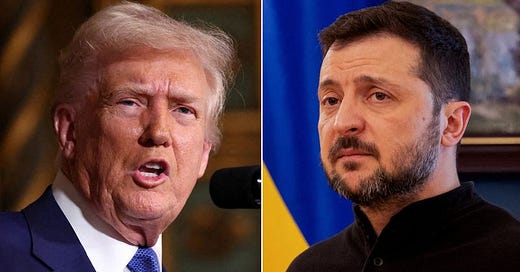Note: I started this post as an audio report, but decided to write an article as well. I added some points in the audio version that are not in the written article, so please give it a listen.
Given that Russia has been launching Iran-supplied drones and ballistic missiles at Ukraine since the start of the full scale invasion, few people here are experiencing a moral dilemma with the U.S. targeting Tehran’s nuclear facilities.
The sound of Shahed drones flying over our apartment buildings each night evoke fear and uncertainty. More than 28,000 Iranian drones have been fired at Ukraine since 2022; more than 10 percent of that number was this June alone. So any military violence directed at the Iranian regime has been met with subdued satisfaction here in Ukraine.
But negative, the long term geopolitical impacts are far more complicated and people here are keenly aware of them all.
Days before the U.S. hit Iran’s nuclear facilities (which CNN reports did little to impact Tehran’s capacity to enrich uranium to build a nuclear weapon), Ukraine’s Ministry of Foreign Affairs wrote a carefully-worded statement calling for calm in the region. They knew this wasn’t going to produce positive results for them:
Realizing the risks of further destabilization of the entire region, we state that the continuation of hostilities may have negative consequences for international security and global financial stability, especially in the oil markets.
I’ll touch on the oil markets part later.
The ministry released a tougher statement supporting the U.S., but this doesn’t undermine my larger point: these strikes hurt Ukraine in the short and long terms.
Officials here are keenly aware that any major military escalation in the Middle East will divert critical global attention (which has waned significantly since 2022) and, most importantly, western military support to that region and leave Ukraine in a compromised position. Ukraine knew that Trump would not back Ukraine with the same vigor as the Biden Administration and his grip on the GOP would further muzzle (see Sen. Lindsay Graham) even the most outspoken Republican advocates for Ukraine.
His calls for ending the war in 30 days, Trump’s coziness with Putin, history of holding up military aid in the GOP-lead House (even when he was not president) and outright hostility towards Ukraine already indicated that Trump does not favor Kyiv’s security needs.
Ukrainian President Volodymyr Zelenskyy said in an interview several weeks ago that the U.S. had diverted anti-drone missiles intended for Ukraine to the Middle East, so actions to prioritize that region had already begun.
Recent reporting finds Israel has only shot down around 65 percent of Iranian missiles as of late, which is a drop from around 90 percent. This means Israel will need to look to the U.S. for interceptor projectiles that Ukraine also needs for its air defenses. Washington has shown that it will prioritize Israel.
One could make the argument that Israeli hits on Iran’s drone facilities will decrease its support chain to Russia and, in effect, result in fewer drones targeting Ukraine. This could be true but there is no indication that will be the case. According to the Associated Press, Russian drones take on the Iranian designs but most are made in Russia not Iran. The AP further reports that much of the technology behind making the Shahed drones that are fired at Ukraine on a near-nightly basis has been transferred to Russia. It is also too early to assess the damage U.S. and Israel strikes have made in Iran.
(Hell, Trump publicly undermines his own DIA director’s intelligence assessments because they contradict his uninformed public statements).
Meanwhile, Europe lacks the infrastructure and political will replace the U.S. as a military aid provider.
But the even bigger issue is Washington’s global security priorities —regardless of political party— aren’t as Eurocentric as they used to be and haven’t been since the fall of the USSR.
Many establishment foreign policy thinkers long viewed the fall of the Soviet Union as a Cold War victory (which it was, in large part), so they did not see the consequent Russian Federation that emerged in the 1990s as a major threat. The fact that Boris Yeltsin, Russia’s first democratically-elected president, was a well-known drunk and widely-viewed as a buffoon made the nuclear-armed nation feel less threatening didn’t help. Couple this with the September 11 attacks of 2001, Washington did not pay much attention to the emergence of Vladimir Putin, who came to power in 1999 and has consequently become the thorn of western foreign policy since.
Then there is the issue of public perception. Our media landscape moved from the Red Scare to the “War on Terror.” Americans, especially, are less concerned about a nuclear missile hitting New York City than they are Islamic extremists blowing up a plane. These shifts are riddled with Islamophobia, of course, but speaks to the psyche of what Americans now comprehend as an immediate threat.
And Russia, viscerally, isn’t at the top of the list.
The U.S. has had a tunnel-vision focus (and a colonial one) on the MIddle East for decades that really wasn’t diverted until Russia’s full-scale invasion of February of 2022. Images of Ukrainian children (read: “white” moms and their “blue-eyed” babies) being killed by Russian occupiers dominated the news cycle. But that attention lasted for just a few months before the media cycle moved on after Kyiv survived Moscow’s push to violently overthrow Ukraine’s government and kill its president.
Another consequence is the price of gas will rise in favour of Russia and to the detriment of Ukraine. Tehran is threatening to close the Strait of Hormuz, cutting off 20 percent of the world’s oil and gas supply. Secretary of State Marco Rubio urged China to convince Iran not to block the strait, saying that the impact of the closure will have devastating impacts on countries around the world.
Ukraine is one of those countries.
For one, energy is one of the few resources Russia has to keep its economy afloat as it endures western sanctions enacted three years ago and are just beginning to take effect. Given that commodities like oil and gas are globally traded, any limited supply will raise prices in favor of Russia. Also keep in mind Russia is the world‘s second exporter of natural gas. China gets a significant amount of its oil and gas from the Middle East and may need to look to Russia to replace anything held up in the Strait of Hormuz.
Most critically, according to The Moscow Times, Russia’s federal budget could end the year with a less-devastating deficit with the rise of prices caused by the Iran-Israel conflict. This means Russia can continue its wartime economy of financing its invasion of Ukraine with less of a heavy hit than expected from lower gas prices over the past few months.
Russia and Iran signed a strategic partnership earlier this year that strengthens cooperation in defense, intelligence sharing, trade and nuclear energy. It is not a military alliance, so don’t expect Russia to send its troops to Tehran’s rescue. While Russia’s role on behalf of Iran remains unclear, what we do know is that instability in the MIddle East helps Moscow distract the West from supporting Ukraine.
And they can moonlight as a peace negotiator for Iran when opportunities allow.
We also need to consider that a protracted war in Iran could produce a refugee wave that could go directly to Europe for refuge. Wars create humanitarian crises that host nations are never prepared to handle. Europe is already tired of the millions of Ukrainians that have fled to its countries over the past three years. The rise of the far right in Germany, France and elsewhere was fueled, in part, by Ukrainian refugees whose presence has been accused of syphoning public services away from locals struggling to get by.
Let me make it plain: if “white,” Christian Ukrainian refugees are irking Europeans, one can only imagine how millions of Iranian Muslims knocking at their door will make Islamophobes’ asses itch and weaken any hold on power Ukraine-friendly moderate parties currently have. When the far right gains power in European capitals ( Slovakia, Hungary, AfD in Germany), anti-Ukraine sentiment takes over its foreign policy.
The worse this conflict gets, the more unstable Iran and the rest of the region becomes. Kyiv doesn’t want this.
There is no telling how much more the conflict between the U.S., Israel and Iran will escalate. But I can’t see any scenarios in which any of this will help Ukraine in the long or short run.














Share this post